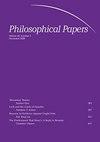有时我是虚构的:叙事与认同
IF 1.3
3区 哲学
0 PHILOSOPHY
引用次数: 0
摘要
摘要大多数分析哲学家认为,我们不能从字面意义上认同虚构人物。具体来说,Carroll和Gaut认为这样做意味着高度的非理性。在这篇论文中,我支持这样一种说法,即由于暂停了怀疑,我们可以认同虚构人物。首先,我依靠个人身份的叙事理论,提出了一个识别过程如何在现实生活中发生的模型。然后,我解释了如何调整这个模型,以解释在认同虚构人物的特殊情况下出现的怀疑暂停。本文章由计算机程序翻译,如有差异,请以英文原文为准。
Sometimes I Am Fictional: Narrative and Identification
Abstract Most analytical philosophers consider that we cannot identify with fictional characters in a literal sense. Specifically, Carroll and Gaut argue that doing so would imply a high degree of irrationality. In this paper I stand for the claim that we can identify with fictional characters thanks to a suspension of disbelief. First, I rely on narrative theories of personal identity to propose a model of how the process of identification might happen in real life. Then, I explain how this model can be adapted to account for the suspension of disbelief that occurs in the special case of identification with fictional characters.
求助全文
通过发布文献求助,成功后即可免费获取论文全文。
去求助
来源期刊

Philosophical Papers
PHILOSOPHY-
CiteScore
2.10
自引率
0.00%
发文量
18
期刊介绍:
Philosophical Papers is an international, generalist journal of philosophy edited in South Africa Original Articles: Articles appearing in regular issues are original, high-quality, and stand-alone, and are written for the general professional philosopher. Submissions are welcome in any area of philosophy and undergo a process of peer review based on initial editor screening and refereeing by (usually) two referees. Special Issues: Topic-based special issues are comprised of both invited and submitted papers selected by guest editors. Recent special issues have included ''Philosophy''s Therapeutic Potential'' (2014, editor Dylan Futter); ''Aging and the Elderly'' (2012, editors Tom Martin and Samantha Vice); ''The Problem of the Criterion'' (2011, editor Mark Nelson); ''Retributive Emotions'' (2010, editor Lucy Allais); ‘Rape and its Meaning/s’ (2009, editor Louise du Toit). Calls for papers for upcoming special issues can be found here. Ideas for future special issues are welcome.
 求助内容:
求助内容: 应助结果提醒方式:
应助结果提醒方式:


